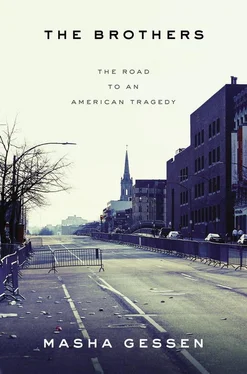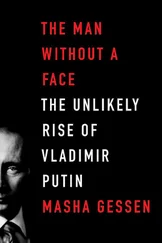“Does that have anything to do with the story?” he asked tersely.
“No,” I said. “I’m just making small talk.” Asking him about his head injury or brain surgery was clearly out of the question.
He relaxed a bit and after a moment’s reflection said, “I pick up things that are not in their proper place.”
Translated, this meant something like: I am a crook. I don’t have a specialty—I am more of an opportunistic, general-interest criminal .
In the late 1990s, Jamal told me, he started a business transporting tobacco from Kyrgyzstan to Russia. By “tobacco” he could have meant just about anything, including tobacco—or drugs. Jamal was based in Grozny, and Anzor was his man in Kyrgyzstan. A prosecutor’s ID and a uniform would have been handy in this line of work.
Anzor and Zubeidat were not lying about going to America, though, or about studying law. They had both signed up to be correspondence students, a system that dated back to Soviet times, when it allowed full-time workers to obtain college degrees without taking time off—but also, in most cases, without learning much. They would travel to their colleges for one or two weeks each semester, to take exams. Anzor and Zubeidat always liked studying—Zubeidat generally grasped any new information as quickly and easily as she had learned Chechen, and Anzor had had the love of learning beaten into him by Zayndy, even if Anzor never was as good a student as his lawyer sister and brother. They were raising Tamerlan to be a good and versatile student, too. Not only was he getting near-perfect grades at Pushkin Gymnasium School Number One, he was also enrolled in extracurricular sports, advanced study of school subjects, and piano lessons.
In 2000, the Tsarnaevs left Tokmok. No one there saw any of them again until the summer of 2012, when Anzor showed up in the Sakhzavod neighborhood one afternoon. He knocked on the metal gate of the house of Badrudi’s brother, on the street where they all had grown up. To his delight, he found the old crew there, Badrudi and his brother and the brothers Abaev, sitting around a table in the garden, eating lamb kebab and drinking brandy. They filled him in on the neighborhood news of the last dozen years: a few marriages, a couple of divorces, some kids, a number of deaths, and the brothers Batukaev—Alaudin had been gunned down right here in Sakhzavod, and Aziz had been in prison for over five years and kept racking up more sentences for inciting unrest there. To his old friends, Anzor looked thinner and older than they had expected, but he sounded as good as ever. His eldest, Tamerlan, he said, was “the hope of the U.S. Olympic team” in boxing. The girls were both married with children. And little Dzhokhar was attending the best university in America on a scholarship. The story made sense to the men: everything had gone pretty much as Anzor and Zubeidat had planned.
• • •
WHEN ANZOR AND ZUBEIDATdisappeared from Tokmok in 2000, those who did not know them very well assumed that, after four years of talk and preparation, they had finally gone to America. Those who did know them knew that Zubeidat was “a dragonfly, never able to stay in one place,” as their Tokmok next-door neighbor Raisa Batukaeva put it. “She was always dragging him off.” This time they went to Dagestan. Why? It is possible that Zubeidat’s longing for the sea temporarily overpowered her American dream. It is possible that they could not conjure a way to move to America—studying law was not going to magically make it happen—and had the idea, however vague, that the troubled Russian Caucasus might make a better launching pad. It is possible that Anzor’s work for Jamal and his habit of impersonating a law enforcement official were starting to get him in trouble. Most likely, it was a combination of all these factors. They sold the apartment in Tokmok, which would have been worth about three thousand dollars at the time, and moved to Makhachkala.
Nothing—not even observing the radical changes in Tokmok after the collapse of the Soviet Union—could have prepared Zubeidat for what she found where the city of her childhood used to stand. It was as though every single building in Makhachkala had been impregnated by an architectural alien that caused it to sprout tentacles and grow other random organs. Everywhere something was being sold: cheap garish clothing imported from Turkey, counterfeit everything—cosmetics, underwear, electronics, footwear. Dagestan was still cobbling its own shoes, an estimated million pairs a year on which no one paid any taxes or extended any guarantees, but now these shoes looked like they had been made in China. The new trading outposts were kiosks assembled from plastic panels, panes of mismatched siding, metal sheeting, acrylic, and whatever else was handy. They would spring up overnight, sometimes blocking the sidewalk, and then change hands, begin to disintegrate, and disappear just as quickly, only to rematerialize as someone else’s shop that sold something else but looked and felt exactly the same as the one that was there before.
There were plenty of places for the residents of Makhachkala now to buy, sell, and haggle, but there was no place for them to conduct the business of being urban dwellers. No cafés or restaurants—only a very few larger stores provided the public space essential to the fabric of any city. Public transport, such as there had been, had fallen into disrepair, replaced by privately owned small vans that followed routes of their own choosing. At the same time, the city was ballooning: its population had gone from 300,000 to 800,000 in less than ten years, but only 100,000 of those who had lived there a decade earlier remained. Everyone was a newcomer, and almost no one had ever lived in a city before. Villages began to sprout at the outskirts of Makhachkala, unregulated construction that used much the same material as the kiosks; rural Dagestanis were trying to make a place for themselves in the capital. Virtually nothing and nobody remained of the city Zubeidat had loved and hated when she was growing up there.
While Makhachkala was swelling, Dagestan itself was starting to fracture in an unprecedented way. A generational religious chasm had opened up. Throughout the seventy years of Soviet rule, most formal study and practice of Islam had lived underground. The dangers inherent in practicing and teaching the religion varied with time—being an observant Muslim could land one in prison in the 1940s or bring reprimand from the local authorities in the 1970s—but the isolated state of Soviet Muslims remained a constant. Sheikhs—elders and teachers in the Sufi tradition—passed their knowledge from generation to generation, and with each iteration something changed. By the end of the twentieth century, Dagestani Muslims practiced local traditions, such as worshipping at the grave of a sheikh, that would strike a Muslim from a place like Saudi Arabia as nothing short of sacrilegious. And the Dagestani Muslims’ knowledge and understanding of the Koran would seem woefully superficial.
It was to Saudi Arabia and, to a lesser extent, the United Arab Emirates that young men from Dagestan began to travel in the 1990s, once the borders opened. There they discovered an Islam based on the rigorous study and discussion of the Koran, as practiced by the Salafis. Many of them stayed and studied for several years. Then they returned and confronted their village elders. Some of the young Salafi neophytes were driven from their villages; others left of their own accord; virtually none lived in peace with local elders, or with their families. Makhachkala’s uneasy boom was at least in part the result of an influx of these newly urban, newly religious disenfranchised young men. Those who continued to practice Sufi Islam, and the secular authorities who increasingly relied on the Sufi hierarchy, called these young men Wahhabis—a dangerous misnomer.
Читать дальше












